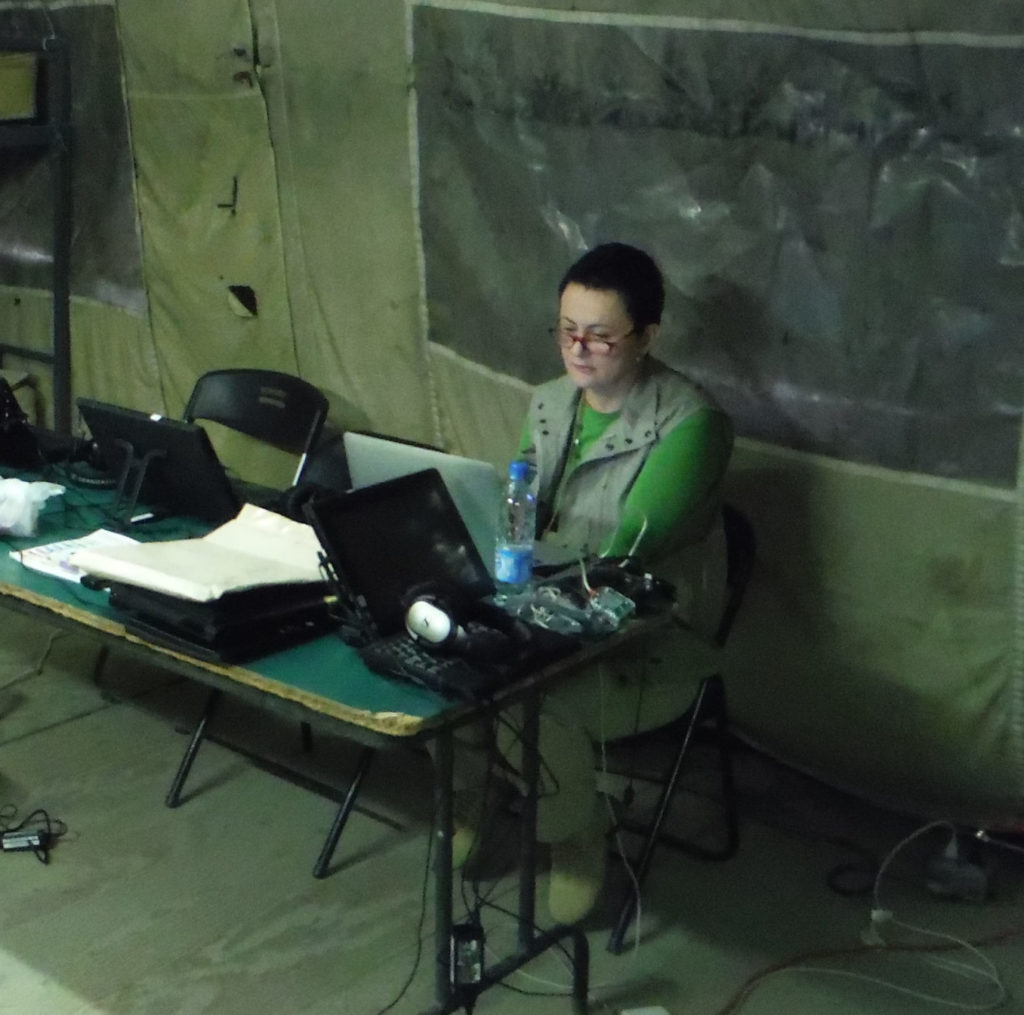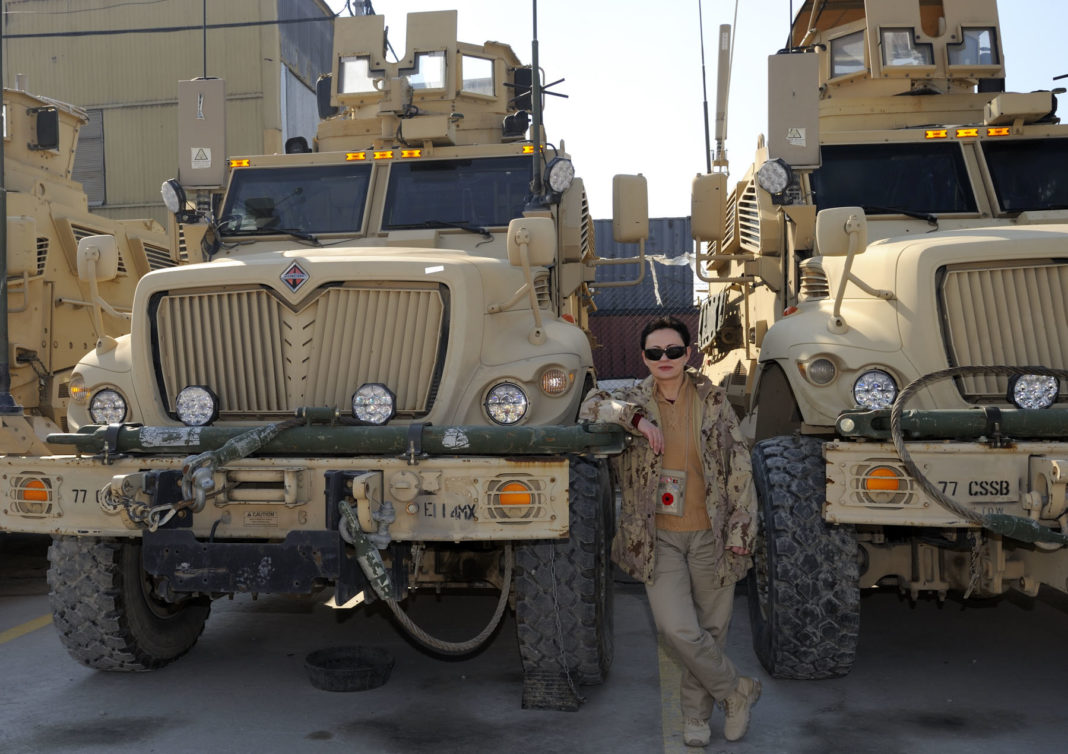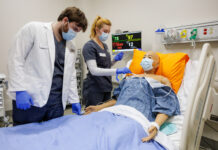Through her clinical and experimental research, a Mercer University School of Medicine professor is working to provide a better understanding of blast-related traumatic brain injuries.
Dr. Ibolja Cernak, professor of pathophysiology and neuroscience, hopes her research will contribute to the development of improved treatments and safety regulations.
Dr. Cernak’s resume includes roles as a researcher and educator at prominent institutions and nearly 200 published papers. She joined Mercer’s faculty in August 2020, and she’ll move from Macon to Columbus soon to be one of the founding professors of the University’s new medical school campus. Dr. Cernak said she wanted to contribute to the education of students who are passionate about helping others, and she discovered Mercer as she was searching for universities with missions of serving underserved populations.

FEATURE PHOTO: Dr. Cernak is shown in Afghanistan in November 2013. She conducted a field study in collaboration with the Canadian Armed Forces assessing emotional and cognitive resilience in military personnel during pre-deployment training, deployment in a war zone and post-deployment.
Dr. Cernak grew up in the former Yugoslavia and completed her medical training in Belgrade. In her job at the Military Medical Academy in Belgrade, her research focused on injuries related to chronic and operational stress as well as military injuries such those caused by explosions, also known as “blast injuries.” After the Yugoslav Wars began, she was drawn more into immediate clinical care and volunteered to be a member of medical teams on the Kosovo battlefield, where her study of blast-related traumatic brain injury began.
She worked with soldiers who were near explosions, collecting blood samples and recording their neurological symptoms. She followed up with them six months later and then at the one-year mark, and the results were “heartbreaking,” she said. Those 20- and 30-year-olds were suffering from debilitating memory loss.
“I started looking at what are the possibilities that just being exposed or close to an explosion could cause such neurological deficits previously seen only after traumatic brain injuries,” Dr. Cernak said. “It was a very rocky road to make people, even physicians, understand that these injuries are real. It is finally after 20-something years that we are looking at what we can do … prevention, early discovery and diagnosis, and treatment.”
By nature of their jobs, soldiers face chronic stress, which weakens their immune system. Combined with continuous exposure to explosions, their bodies become more susceptible to chronic and lasting health issues.
Dr. Cernak explained that waves from an explosion affect the entire body and its organs. Her research focuses on whether something can be done to intervene and stop the effects and if there’s a way to give the human brain increased resilience to certain situations.
“When it’s such a sudden propagation of a pressure wave, initially generated by an explosion and going through the body and its cells, this is sometimes enough for cellular and even sub-cellular components to become fragile or underperform,” said Dr. Cernak, adding that these underperforming cells could trigger neurodegenerative conditions such as Alzheimer’s disease.
Dr. Cernak is currently involved in three research collaborations. Last fall, she became a visiting fellow with the Japanese National Defense Medical College Research Institute. The experimental research team is studying how blood vessels in the brain and entire body respond to blast waves and identifying vascular sensitivity. She’s also working with a team at the University of Missouri School of Medicine to conduct experiments using live explosives in open fields. Using electron microscopy, they are looking at in-depth details on the cellular level.

Dr. Cernak’s third collaboration is at the clinical level with a research team affiliated with Harry S. Truman Memorial Veterans’ Hospital in Columbia, Missouri. They are working to identify and classify the main symptoms seen in soldiers with traumatic blast injuries, with the goal of aligning pre-clinical research models with clinical reality and submitting comprehensive recommendations about the uniqueness of blast-induced traumatic brain injury.
Right now, no unique International Classification of Diseases medical code exists for blast-related traumatic brain injury, despite the large number of soldiers dealing with this clinically and biologically unique pathological condition, she said. Medical professionals often have to use three to five different codes to describe the situation for insurance purposes, which can lead to difficulties for patients as they seek coverage of their care.
Dr. Cernak hopes that, through her research, she can be one piece of the equation for improving the health care and overall health of military personnel and veterans.
“If we understand better what is really happening to the body, then we will be able to develop some preventative measures, better protection and better safety regulations. Through better understanding, we can diagnose earlier and have better treatment,” she said.
“Usually treatment now is much too late to pull people back to a normal-level function. I hope that through this research altogether, we will have training which will strengthen people’s bodies to be less susceptible and more resistant to these injuries. And it seems we can do that.”









